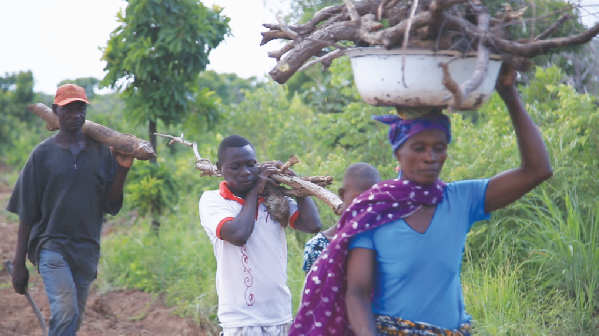
SEND Ghana implements Gender Model Family concept
Some families in Chamba, a predominantly farming community with about 10,230 inhabitants, have accepted the Gender Model Family (GMF) concept. The concept is a training programme developed to involve community members and families to live in an equitable and just manner.
Advertisement
Through training and follow-up support, men and women are equipped with knowledge and skills to live together, socialise and ensure that boys and girls have the same opportunities to develop their potentials.
Activities in the community come alive, especially on market days when traders trek and travel from far away and nearby communities to sell their produce or other items. This is usually on Fridays.
Even though women come to the market, most of them come to buy food items for the preparation of meals. Therefore, the market seems to be controlled mostly by the men.
The Social Enterprise Development (SEND) Ghana’s Director in charge of the Livelihood Security Programme, Mr Raymond Wekem Avatim, believes that the concept envisages an equitable redistribution of household chores among family members to ease the workload on women and girls in families, as well as improve family relations.
The GMF practice will enable women to participate effectively in productive and decision-making roles in their families and communities. The school performance of girls in these families is also expected to improve as they will have more time for their studies.
Sharing experiences
Sharing her story with me, Hannah Mensah, a 14-year-old primary school girl from a family of four (two boys and two girls), said she still had to go to the dam to fetch water every morning before going to school.
This activity is repeated in the evenings. Her brothers do not support her to fetch water for the household. They (the boys) wake up in the morning, take their bath and go to school. There are actually no household chores for them. Roles are still not shared equally. In the evening, the boys go to the field to play football.
The situation, Hannah says, is affecting her studies. She is always late to school and unable to do her homework on time. Though the parents were aware of the situation, they said there was very little they could do because of their culture.
This is the reason SEND Ghana believes that there is the need to promote gender equity among families, especially in farming communities in the Eastern Corridor of Ghana where this practice is dominant.
Support of community
Again, the support of community stakeholders must be sought in order to remove the burden, especially on women who are unable to participate effectively in both productive and management roles in their communities.
Robert Binanyikiba Gbanzaba is a 48-year-old farmer who is married with eight children–– four boys and four girls. He lives in Buya Nchaponi, a suburb of Buya in the Kpandai District. His elder brother usually requests of him to read documents on the GMF. After reading on the model, he decided to be part of it because, according to him, it was a good thing.
Furthermore, he decided to include his family because even before the Global Affairs Canada-funded Food Security through Cooperatives in Northern Ghana (FOSTERING) project kick-started, they had participated in many gender training workshops organised by SEND GHANA, which enabled some of them to understand what GMF was and what benefits one could derive from it.
It is, therefore, not surprising to see a few men at the stream. The understanding I got initially was that fetching water was a woman’s job.
Benefits
According to Mr Gbanzaba, he decided to adopt the GMF approach so that others would see the benefits. He described how he trained his children to fetch water together and sweep the compound, indicating that their support eased their mother's workload.
Adopting the GMF model has made it possible for his wife to support him financially where the children are concerned, contrary to their tradition.
“So if I don't have money, I go to her and she supports me; she sends money to the children. All I have to do is to find money to pay for the school fees.”
Criticisms
According to him, despite criticisms from some in the community, he had noticed that some people had started imitating the concept secretly.
The Chief Executive Officer of SEND West Africa, Mr Siapha Kamara, believes that the GMF practice will enable women to participate effectively in productive work and decision-making roles in their families and communities.
“The school performance of girls in these families is also expected to improve as they will have more time for their studies,” he said.
Women in Ghana continue to face challenges that hinder their ability to participate in the socio-economic development of this country. Therefore, there is the need to raise awareness and garner support towards promoting gender equity in Ghana and also to make firm commitments that will ensure that those obstacles are addressed.
The vision of SEND Ghana is to have “A Ghana where people’s rights and well-being are guaranteed, and its mission is to work to promote good governance and equality of women and men in Ghana.”




